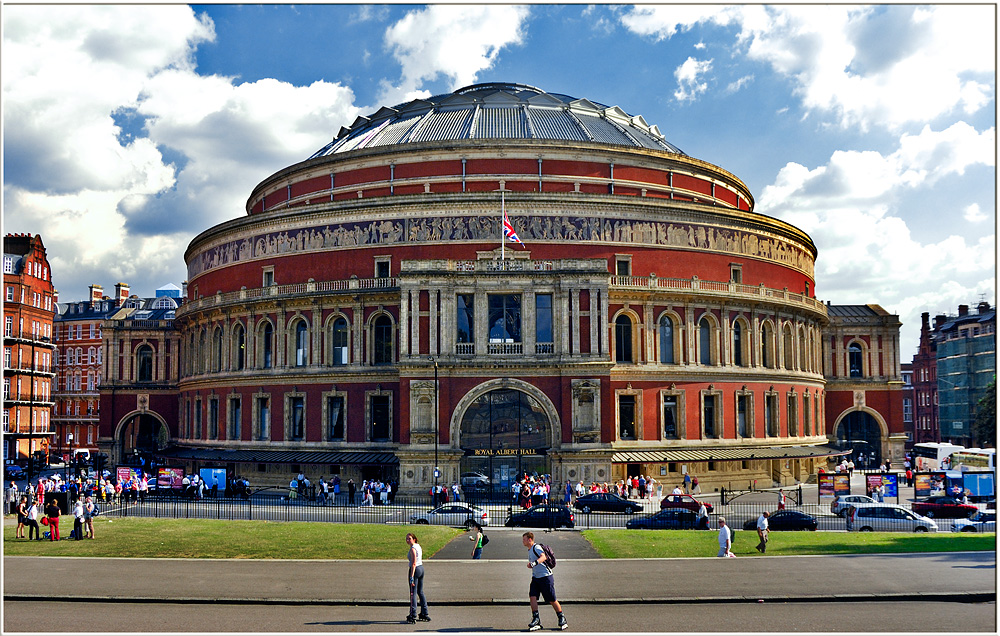Difference between revisions of "Royal Albert Hall"
From Londonhua WIKI
Mthatfalvi (talk | contribs) |
Mthatfalvi (talk | contribs) |
||
| Line 27: | Line 27: | ||
The Royal Albert Hall site was once the Gore estate. Gore estate, according to the Royal Albert Hall website, were bought by the Exhibition’s Royal Commission to create the "cultural quarter" called Albertopolis,named after Prince Albert, in 1851.<ref name = "his"> Pre-Opening — Royal Albert Hall. (n.d.). Retrieved June 15, 2017, from http://www.royalalberthall.com/about-the-hall/our-history/explore-our-history/time-machine/pre-opening/ </ref> Albertopolis is now the home to the [[Natural History Museum]], [[Victoria and Albert Museum]], the [[London Science Museum|Science Museum]] and the Imperial College. <br><br> | The Royal Albert Hall site was once the Gore estate. Gore estate, according to the Royal Albert Hall website, were bought by the Exhibition’s Royal Commission to create the "cultural quarter" called Albertopolis,named after Prince Albert, in 1851.<ref name = "his"> Pre-Opening — Royal Albert Hall. (n.d.). Retrieved June 15, 2017, from http://www.royalalberthall.com/about-the-hall/our-history/explore-our-history/time-machine/pre-opening/ </ref> Albertopolis is now the home to the [[Natural History Museum]], [[Victoria and Albert Museum]], the [[London Science Museum|Science Museum]] and the Imperial College. <br><br> | ||
The building was to be named originally The Central Hall of Arts and Sciences it was changed to the [[Royal Albert Hall]] by Queen Victoria in the honor of her husband Prince Albert.The official name of the hall is [[Royal Albert Hall|The Royal Albert Hall of Arts and Sciences]]. | The building was to be named originally The Central Hall of Arts and Sciences it was changed to the [[Royal Albert Hall]] by Queen Victoria in the honor of her husband Prince Albert.The official name of the hall is [[Royal Albert Hall|The Royal Albert Hall of Arts and Sciences]]. | ||
| − | On the 20th of May 1867, The foundation stone was laid by Queen Victoria in a great ceremony.<ref name = "his"/> The building was opened on the 29th of March 1871 by the Prince of Wales since the Queen was too emotional to speak at the opening. <ref> 1800s — Royal Albert Hall. (n.d.). Retrieved June 15, 2017, from http://www.royalalberthall.com/about-the-hall/our-history/explore-our-history/time-machine/1800s/ </ref> To this day, the hall has been used all different displays and performances of the arts and sciences, | + | On the 20th of May 1867, The foundation stone was laid by Queen Victoria in a great ceremony.<ref name = "his"/> The building was opened on the 29th of March 1871 by the Prince of Wales since the Queen was too emotional to speak at the opening. <ref> 1800s — Royal Albert Hall. (n.d.). Retrieved June 15, 2017, from http://www.royalalberthall.com/about-the-hall/our-history/explore-our-history/time-machine/1800s/ </ref> To this day, the hall has been used all different displays and performances of the arts and sciences, including ballet, exhibitions, conventions, memorial concerts, classical music concerts, pop music performances, theater, and so much more. |
<br><br> | <br><br> | ||
Revision as of 10:00, 15 June 2017
Royal Albert Hall
 Royal Albert Hall | |
| Artist | Attributed to Panos Asproulis from London, United Kingdom |
|---|---|
| Year | 2005 |
| Location | London, England. |
Overview
The Royal Albert Hall is a concert hall located in South Kensington, London. It has a capacity of up to 5,272 seats. It's namesake is for Prince Albert, Queen Victoria's husband. It was opened by her in 1871. Each year it shows performances in wide variety including classical, rock and pop concerts, ballet, opera, film screenings with live orchestra, sports, award ceremonies, school and community events, charity performances and banquets.
Contents
History
The Royal Albert Hall site was once the Gore estate. Gore estate, according to the Royal Albert Hall website, were bought by the Exhibition’s Royal Commission to create the "cultural quarter" called Albertopolis,named after Prince Albert, in 1851.[1] Albertopolis is now the home to the Natural History Museum, Victoria and Albert Museum, the Science Museum and the Imperial College.
The building was to be named originally The Central Hall of Arts and Sciences it was changed to the Royal Albert Hall by Queen Victoria in the honor of her husband Prince Albert.The official name of the hall is The Royal Albert Hall of Arts and Sciences.
On the 20th of May 1867, The foundation stone was laid by Queen Victoria in a great ceremony.[1] The building was opened on the 29th of March 1871 by the Prince of Wales since the Queen was too emotional to speak at the opening. [2] To this day, the hall has been used all different displays and performances of the arts and sciences, including ballet, exhibitions, conventions, memorial concerts, classical music concerts, pop music performances, theater, and so much more.
Theater Space
Visiting Arts and Sciences Groups
English National Ballet
Performances
References
- ↑ 1.0 1.1 Pre-Opening — Royal Albert Hall. (n.d.). Retrieved June 15, 2017, from http://www.royalalberthall.com/about-the-hall/our-history/explore-our-history/time-machine/pre-opening/
- ↑ 1800s — Royal Albert Hall. (n.d.). Retrieved June 15, 2017, from http://www.royalalberthall.com/about-the-hall/our-history/explore-our-history/time-machine/1800s/
External Links
If appropriate, add an external links section
Image Gallery
If appropriate, add an image gallery